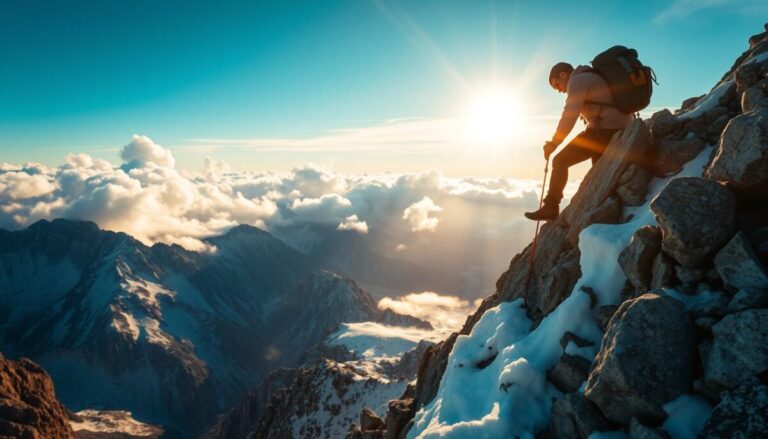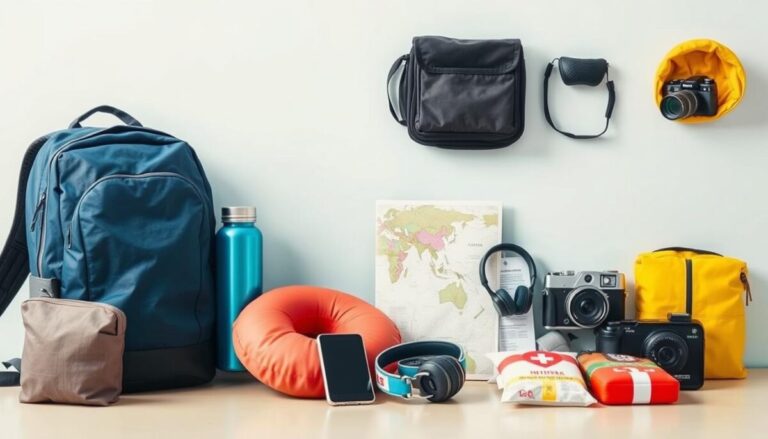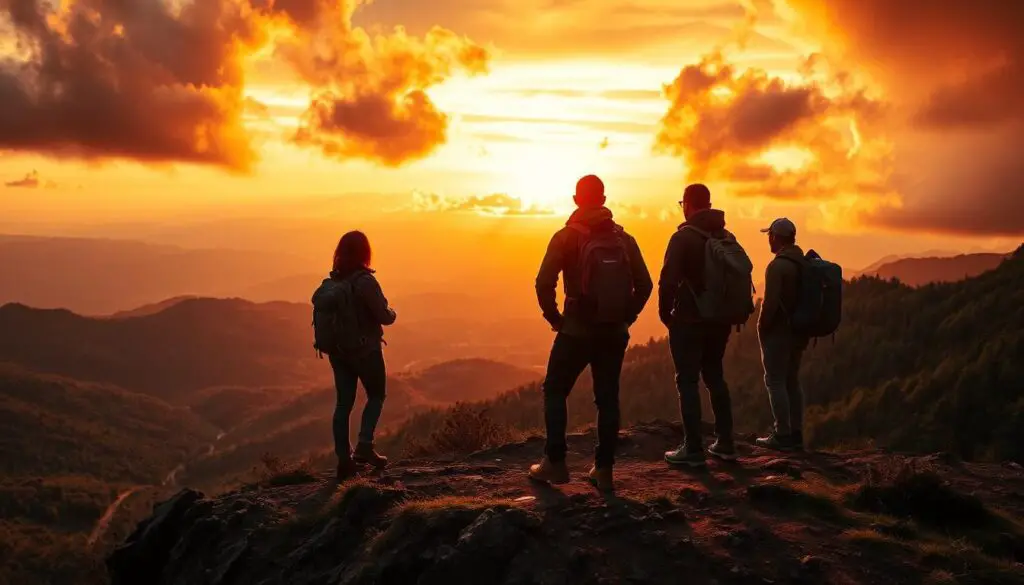
Planning your first backpacking trip can feel overwhelming, even when you’re going solo. The secret to a great adventure is in the planning and research.
With the right expert travel tips and backpacking guides, you’ll feel confident and prepared. These tools will guide you to epic trails and unforgettable destinations. Your dream trip will become a reality.
These guides will prepare you for the challenges of backpacking. You’ll make memories that last a lifetime.
Key Takeaways
- Research and planning are key for a successful backpacking trip.
- Expert travel tips help you explore new places.
- Backpacking guides offer insights into amazing trails and spots.
- Good preparation means a stress-free journey.
- The right resources turn your dream trip into reality.
The Essence of Backpacking Adventures
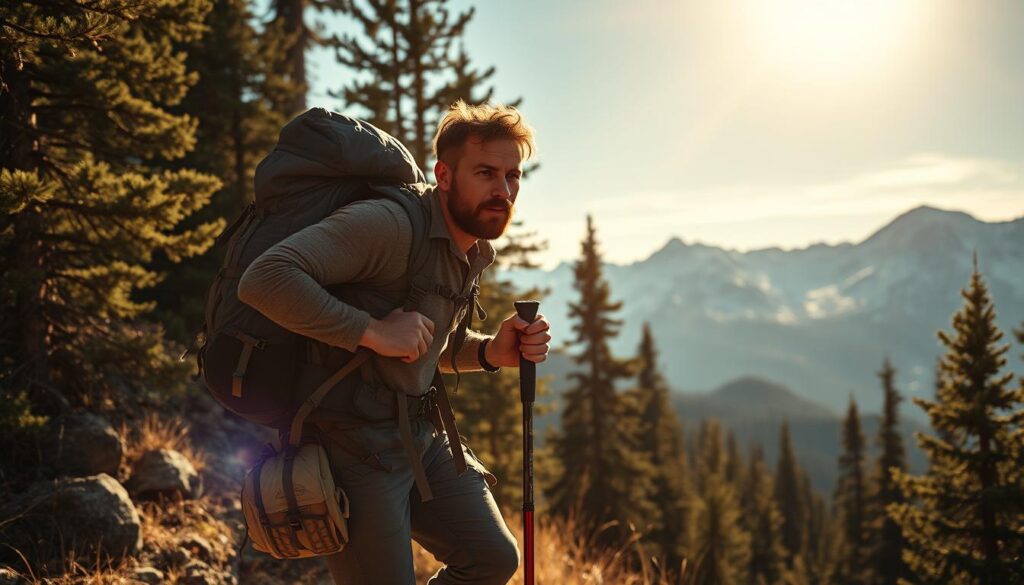
Backpacking is all about facing challenges and changing yourself through unique experiences. When you start a backpacking guide-inspired trip, you’re not just traveling. You’re diving into different cultures, meeting new people, and making unforgettable adventures.
It’s about being open to new things and challenges. Backpacking lets you connect with nature, learn about different lives, and appreciate the world’s variety.
What Sets Backpacking Apart from Traditional Travel
Backpacking is more flexible and spontaneous than traditional travel. It lets you change plans, find hidden spots, and connect with locals deeply. When you learn how to go backpacking, you see it’s about the experiences, not just the places.
“The journey of a thousand miles begins with a single step.” – Lao Tzu
Backpacking pushes you out of your comfort zone and into the unknown. It helps you grow, become more resilient, and see life from a new angle.
The Transformative Power of Backpacking Journeys
Backpacking changes how you see the world and yourself. As you explore new places, you learn new skills, gain confidence, and make memories that last a lifetime.
| Aspect | Traditional Travel | Backpacking |
|---|---|---|
| Flexibility | Limited | High |
| Cultural Immersion | Moderate | Deep |
| Personal Growth | Variable | Significant |
By choosing backpacking, you explore new places and discover new parts of yourself. Whether you’re after adventure, cultural experiences, or personal growth, backpacking offers a unique and life-changing journey.
Comprehensive Backpacking Guides for Every Traveler
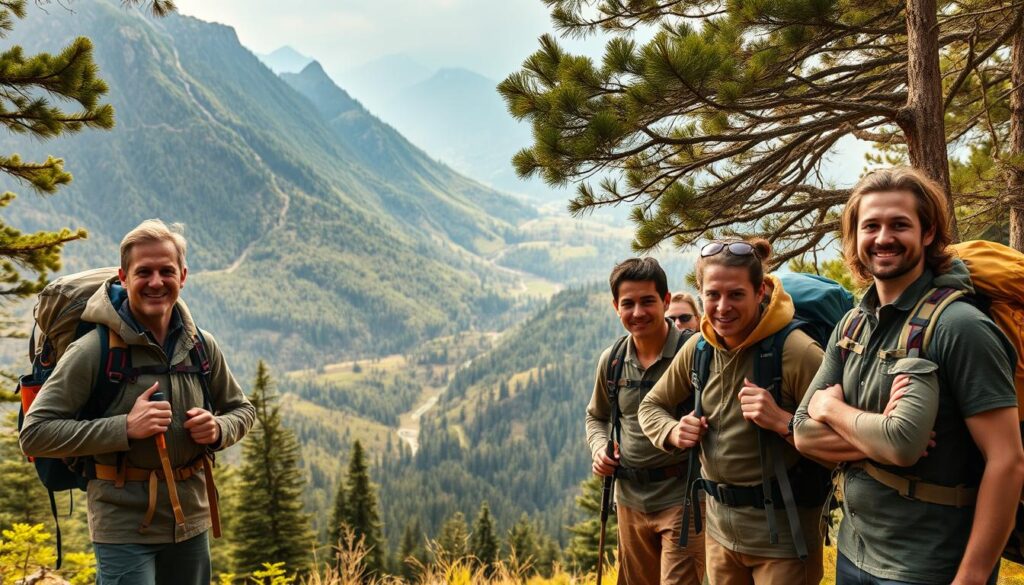
The world of backpacking is full of guides and resources. But not all are the same. It’s important to find reliable and detailed information for your trip.
Must-Read Books and Digital Resources
Guidebooks are a big help for backpackers. Let’s Go and Lonely Planet give great insights into places around the world. Digital resources like travel blogs and forums are also key. Sites like Backpacker and The Trek share lots of info on trails, camping, and travel tips.
- Guidebooks for in-depth destination knowledge
- Travel blogs for personal anecdotes and tips
- Online forums for community advice and support
Specialized Guides for Different Backpacking Styles
Backpacking has many styles, like ultralight hiking and family trips. Special guides help with these, giving advice and itineraries. For example, ultralight guides help you carry less, while family guides make trips fun for kids.
- Ultralight backpacking guides for minimizing pack weight
- Family backpacking guides for planning enjoyable trips with children
- Wilderness guides for navigating remote areas
How to Evaluate and Choose Reliable Travel Information
There’s a lot of travel info out there. It’s key to check if sources are trustworthy. Look for guides by experienced backpackers or experts. Make sure the info is up-to-date, as places can change.
User reviews and ratings can also help. By being careful and using many sources, you can find the best info for your trip.
Crafting Your Perfect Backpacking Itinerary
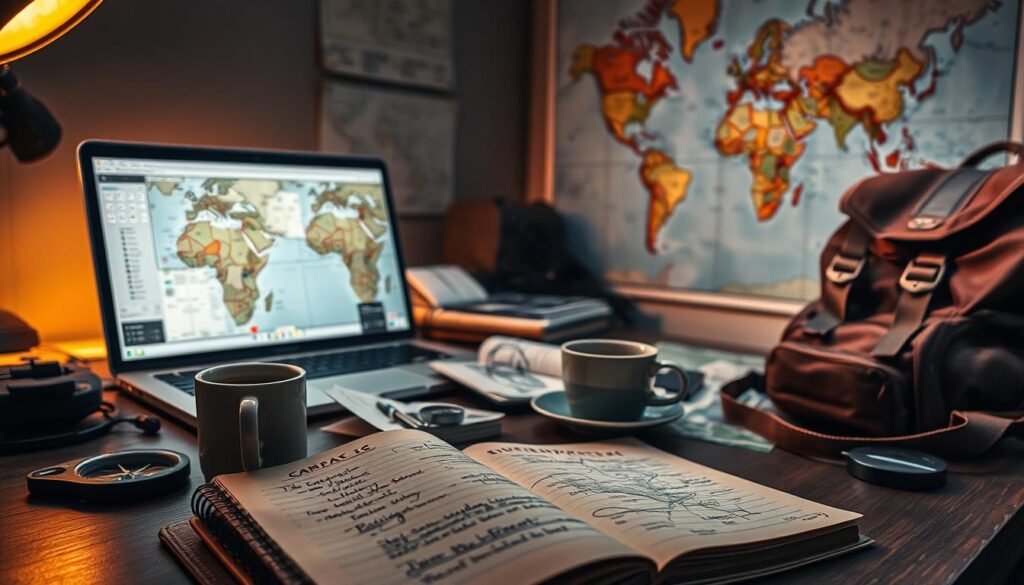
Planning a backpacking trip is all about finding the right mix. You need a plan to guide you but also room for surprises. A good itinerary should be flexible and open to new adventures.
Balancing Structure with Spontaneity
When you plan your trip, aim for a mix of structure and freedom. Expert travel tips say to plan 60% of your trip and leave 40% for spontaneity. This way, you can enjoy your plans and also discover new things.
This approach lets you make the most of your time. It keeps you open to new experiences and unexpected finds.
Time Management for Multi-Destination Adventures
Time management is key for trips to many places. Think about how long it takes to get from one place to another. Make sure you have enough time for rest and exploring.
- Look up travel options and schedules early.
- Choose places based on what you like and how you travel.
- Use backpacking gear that’s light and easy to carry. This saves time packing and unpacking.
Creating Realistic Daily Plans That Allow for Discovery
Having a realistic daily plan is important for a fun and stress-free trip. Think about your physical limits and the terrain you’ll face.
| Terrain Type | Recommended Daily Distance | Rest Days |
|---|---|---|
| Flat Terrain | 15-20 miles | Every 3-4 days |
| Hilly/Mountainous Terrain | 8-12 miles | Every 2-3 days |
Use trail navigation tools and apps to stay on course. They help you adjust your plan if needed.
Selecting Unforgettable Backpacking Destinations
Finding the perfect backpacking spot is key to making memories that last a lifetime. It’s about experiencing the beauty of nature. Whether you’re new to backpacking or have done it before, the right place can change your trip.
Top Destinations for First-Time Backpackers
For beginners, look for places with easy-to-follow trails and basic comforts. The Appalachian Trail in the U.S. is great for its mix of tough paths and stunning views. The Tour du Mont Blanc in Europe also offers a supported journey with amazing mountain views.
First-timers should look for spots with:
- Clear trail signs
- Places to restock supplies
- Simple shelters and campsites
Off-the-Beaten-Path Adventures for Experienced Travelers
For those who love a challenge, try routes that are less crowded. The Grand Traverse in Michigan’s Upper Peninsula is rugged and remote. In New Zealand, the Milford Track is famous for its stunning views, but it’s very popular, so plan ahead.
Seasoned adventurers might enjoy:
| Destination | Terrain | Notable Features |
|---|---|---|
| Grand Traverse, Michigan | Rugged, varied | Lakes, forests, and scenic overlooks |
| Milford Track, New Zealand | Mountainous, rainforest | Waterfalls, valleys, and mountain peaks |
Seasonal Considerations for Popular Backpacking Routes
Knowing the weather and trail conditions is important for a great trip. For example, hiking the Pacific Crest Trail from north to south helps avoid bad winter weather in the south.
Think about:
- Weather and possible dangers like snow or heat
- Trail state and upkeep plans
- Rules and permits needed
Choosing your backpacking spot wisely, based on your experience, terrain, and weather, ensures a trip you’ll always remember. It’s about finding the right adventure for you.
Essential Backpacking Gear and Equipment
To start a backpacking adventure, you need the right gear. The right equipment makes your trip more comfortable, safe, and convenient.
Choosing the Right Backpack for Your Adventure Type
Choosing the right backpack is key. Think about how long you’ll be out, the terrain, and what you like. Look for durability, weather resistance, and comfort features like padded straps.
A good backpack spreads the weight well. This lets you move easily. For longer trips, a 60-80 liter pack is best. Short trips need less space.
Clothing and Footwear Essentials for Various Climates
Right clothing and shoes are essential for different weather. Choose clothes that dry fast and keep you cool. In cold weather, wear layers. In warm weather, go for light, breathable clothes.
Shoes should be strong, waterproof, and fit the terrain. Hiking boots or trail running shoes are good choices.
Tech Gadgets Worth Their Weight
Today, tech gadgets can make your trip better. A portable power bank keeps your devices charged. A GPS watch or device helps with navigation. A rugged case protects your smartphone.
Other gadgets include a lightweight camera, a water filter, and a personal locator beacon (PLB) for emergencies.
Camping Essentials for Wilderness Backpacking
For wilderness backpacking, the right camping gear is essential. You’ll need a lightweight tent, a sleeping bag for cold weather, and a sleeping pad for comfort.
Other must-haves are a portable stove, a water bottle or hydration bladder, and a headlamp or flashlight for night.
Budgeting for Your Backpacking Adventure
Backpacking can be affordable if you manage your money well. When planning your trip, make a travel budget that covers everything. This includes transportation, where you’ll stay, food, and fun activities.
Creating a Realistic Travel Budget
First, list all your possible expenses. This includes getting there, where you’ll stay, eating, and what you’ll do. Expert travel tips say to also save for surprises. Use backpacking guides to guess costs for places and things to do.
Don’t forget to include the cost of your gear, travel papers, and any health checks before you go. A good budget keeps you stress-free on your trip.
Money-Saving Strategies on the Road
On your journey, there are ways to save money. Choose cheaper places to stay, like hostels or campsites. Cooking your own meals instead of eating out saves a lot too.
Using public transport or walking and biking saves money. Also, watch your spending and avoid buying things you don’t need. This keeps you within your budget.
“The key to successful backpacking is not just about saving money, but also about making the most of your experience.” –
Managing Finances During Extended Trips
For longer trips, managing your money is even more important. Use cash, credit cards, and debit cards for flexibility. It’s smart to have an emergency fund in a place you can get to easily.
Check your budget often and adjust it if needed. Using survival skills like foraging or camping can also save money. By following these tips and staying informed, you can have a great backpacking trip without spending too much.
Navigating Transportation Options Worldwide
Backpacking requires knowing your transportation options well. You’ll find many ways to travel, each with its own benefits and challenges.
It’s key to know the difference between public and private transport. Public transit, like buses and trains, is cheap and efficient. But private transport, like renting a car, gives you more freedom but costs more.
Public Transit vs. Private Transport Considerations
Choosing between public and private transport depends on your budget and trip needs. Public transit is great for short trips and saves money. But it might not be the best for long trips or carrying lots of gear.
| Transportation Type | Cost | Flexibility | Convenience |
|---|---|---|---|
| Public Transit | Low | Low | High |
| Private Transport | High | High | Medium |
Transportation Passes and Discount Options for Backpackers
Cities often have special passes and discounts for travelers. These can be single-day or multi-day passes, saving you a lot of money. It’s smart to look into these before you go.
Tips for Using Transportation Passes:
- Research available passes and their validity periods.
- Consider purchasing a pass that covers multiple modes of transport.
- Look for discounts or promotions for young travelers or students.
Knowing your transport options and using passes can make your backpacking trip smoother. You’ll enjoy your travels more without the stress.
Accommodation Strategies for Budget-Conscious Travelers
If you’re watching your budget, you’ll want to find affordable places to stay. Finding the right place to stay is key to a good backpacking trip. There are many ways to save money on your trip.
Hostels, Guesthouses, and Budget Accommodations
Hostels and guesthouses are great for those on a tight budget. They’re not just cheap places to stay. They also offer a chance to meet other travelers.
Key Features to Look For:
- Reliable reviews from previous guests
- Secure payment options
- 24-hour front desk or staff presence
- Social areas for meeting other travelers
Camping and Wilderness Lodging Options
Camping is perfect for those who love the outdoors. You can choose to camp in a tent or rent a campsite with amenities. Wilderness lodging, like eco-lodges or cabins, is another option for those who want comfort in nature.
Tips for Camping:
- Research campsites in advance
- Pack essential camping gear
- Follow local regulations and Leave No Trace principles
Using Accommodation Apps and Booking Platforms
Booking places to stay is now easier than ever. Apps and platforms like Booking.com, Hostelworld, and Airbnb have lots of options. Always read reviews, check the location, and know the cancellation policies.
| Platform | Specialty | User Reviews |
|---|---|---|
| Booking.com | Wide range of accommodations | Verified reviews |
| Hostelworld | Hostel and budget lodging | Detailed guest reviews |
| Airbnb | Private homes and apartments | Host and guest reviews |
By using these strategies, you can save money and have a better backpacking trip. Whether you choose hostels, camping, or book online, there are many affordable options out there.
Developing Essential Survival Skills for Backpackers
Backpackers need to learn survival skills to explore safely. Whether in forests or deserts, the right skills are vital. They can save your life in an emergency.
Wilderness First Aid and Emergency Preparedness
Wilderness first aid is key for backpackers. It teaches how to treat injuries and illnesses in remote areas. You’ll learn to clean wounds, splint bones, and spot serious health issues.
- Learn basic first aid techniques
- Carry a first aid kit tailored to your backpacking needs
- Understand how to use the items in your first aid kit
Weather Interpretation and Natural Hazard Awareness
Knowing weather and natural hazards is essential. Reading weather signs helps you prepare for changes. Being aware of hazards like floods and extreme temperatures keeps you safe.
Key weather interpretation skills include:
- Recognizing cloud formations
- Understanding wind patterns
- Using a barometer to predict weather changes
Basic Survival Techniques Every Backpacker Should Know
Every backpacker should know basic survival techniques. These include finding and purifying water, starting a fire, and building a shelter.
- Finding and Purifying Water: It’s vital to know how to find and purify water. You can boil it, use filters, or apply purification tablets.
- Starting a Fire: Fire provides warmth, a way to cook, and a signal for help. Learn to start a fire with matches, lighters, or primitive methods.
- Building a Shelter: A good shelter keeps you safe from the elements. Learn to build simple shelters with natural materials or a tent.
Mastering these survival skills boosts your safety and enjoyment on backpacking trips. Always be prepared for a successful adventure.
Mastering Trail Navigation and Hiking Techniques
When you head into the wilderness, knowing how to navigate is key. Good navigation helps you stay on course, reach your goals, and have a great backpacking trip.
Map Reading and Compass Skills
Map reading and compass skills are basic but vital. A topographic map shows the terrain, landmarks, and dangers. To use a map well, you need to know about scale, legend, and measuring distances.
A compass is a must-have for finding your way. It helps you figure out your direction and match your map to the real world. To use a compass right, you must learn to take bearings and find your spot.
GPS and Digital Navigation Tools
GPS devices and apps have changed trail navigation. They give exact location info and work with digital maps to track your path.
But, it’s key to know their limits, like battery life and signal strength. Always carry a map and compass as a backup, so you can navigate even if your device fails.
| Navigation Tool | Advantages | Disadvantages |
|---|---|---|
| Map & Compass | Reliable, no battery required | Requires skill and practice |
| GPS Device | Precise location data, easy to use | Battery dependent, signal issues |
| Smartphone App | Convenient, often free or low cost | Battery drain, signal issues |
Understanding Trail Markers and Backcountry Signage
Trail markers and signs are key to guiding hikers. Knowing the different markers and signs helps avoid getting lost and keeps you on track.
Trail markers include painted blazes, cairns, and signposts. Getting to know local marking styles and staying alert can make navigating easier.
Sustainable and Responsible Outdoor Adventure Practices
As a backpacker, you can protect nature’s beauty by using sustainable travel methods. This means enjoying the outdoors while keeping it safe for others in the future.
Leave No Trace Principles for Wilderness Areas
The Leave No Trace principles help reduce our impact on nature. They include planning ahead, staying on trails, and disposing of waste correctly. It’s also important to respect wildlife.
- Plan ahead and prepare to minimize your impact.
- Travel and camp on durable surfaces to avoid damaging the terrain.
- Dispose of waste properly to keep the environment clean.
- Leave what you find to preserve the natural state.
- Minimize campfire impacts to reduce the risk of wildfires.
- Respect wildlife to avoid disrupting their natural habitats.
- Be considerate of other visitors to ensure a pleasant experience for everyone.
Cultural Sensitivity During International Backpacking
Being culturally sensitive is key when backpacking abroad. It means respecting local customs and traditions.
When traveling, learn about the local culture. Understand dress codes, learn basic phrases, and respect cultural norms.
| Cultural Aspect | Tips for Backpackers |
|---|---|
| Dress Code | Dress modestly, covering shoulders and knees when necessary. |
| Local Language | Learn basic phrases like “hello,” “thank you,” and “excuse me.” |
| Cultural Norms | Be aware of local customs and traditions to avoid unintentionally offending locals. |
Supporting Local Communities Through Ethical Tourism
Ethical tourism helps local economies and communities. Choose local places to stay, eat, and buy goods from local artisans.
This way, you support the local economy and help keep cultural heritage alive.
Key Practices for Ethical Tourism:
- Choose local accommodations over international chains.
- Support local businesses and artisans.
- Engage with local communities respectfully.
By following these practices, you make your backpacking trips better. You also help protect the environment and support local cultures.
Conclusion: Embarking on Your Backpacking Journey
As you get ready for your backpacking trip, remember that planning is essential. With the right guides and tips, you can make unforgettable memories. These moments will last a lifetime.
Planning your trip involves many things like where to go, your schedule, what gear to bring, and staying safe. By mixing a plan with room for surprises, you can have a trip that’s both structured and full of discovery.
Now that you know more, you’re all set for your backpacking adventure. Whether you’re experienced or new to travel, the world has endless adventures waiting for you. So, pack up, grab your backpack, and start your epic journey.
FAQ
What are the essential items to include in my backpacking gear?
How do I choose the right backpacking trail for my experience level?
What are some effective budgeting strategies for backpacking adventures?
How can I navigate using a map and compass, and when should I use GPS devices?
What are the Leave No Trace principles, and why are they important?
How can I stay safe while backpacking in areas with natural hazards?
What are some accommodation options for backpackers on a budget?
How do I balance structure and spontaneity when planning a backpacking itinerary?
What are some tips for managing finances during extended backpacking trips?
How can I support local communities through ethical tourism while backpacking?
Share :
You Might Also Like

